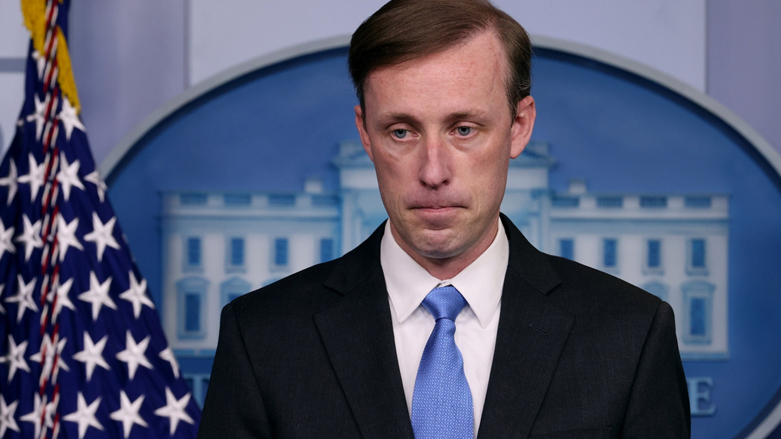US hails Iran’s removal from U.N. Commission on Women; blasts Iran for weapon sales to Russia; and ‘destabilizing actions throughout the Middle East’

WASHINGTON DC, United States (Kurdistan 24) - The White House warmly welcomed the U.N. decision to oust Iran from the Commission on the Status of Women, while using the occasion to underscore two other categories of malign Iranian activity: the sale to Russia of weapons that Moscow is using against Ukraine, as well as what National Security Advisor Jake Sullivan characterized as Iran’s “destabilizing actions throughout the Middle East region.”
Removal of Iran from UN Commission on Status of Women
On Wednesday, the U.N. Economic and Social Council voted in support of a U.S.-sponsored resolution to oust Iran from the Commission on the Status of Women.
The U.S. took that action in response to Iran’s suppression of the ongoing protests, entering their fourth month, triggered by the death on Sept. 16 of the young Kurdish woman, Jinna (Mahsa) Amini, while she was detained by Tehran’s so-called morality police for not properly wearing a headscarf.
The measure against Iran was approved 29 to 8 by the 54 members of the Council, with 16 abstentions.
Read More: UN council ousts Iran from UN commission backing women
US Welcomes Decision, as Attitudes toward Iran Shift
Subsequently, the White House issued a statement hailing the Council’s decision in strong terms. Calling the vote “historic,” Sullivan noted that it had been taken “in response to the Iranian regime’s repression of women and girls” and reflected a “growing international consensus” on the need “to hold Iran accountable for the abuses it is committing against its own people.”
Sullivan then cited the regime’s other malign activities: “the violence it is enabling against the Ukrainian people” through arms sales to Russia, “as well as its destabilizing actions throughout the Middle East region.”
Sullivan also denounced “the recent horrifying executions in Tehran” of Iranian protestors. That includes the public execution on Monday, in which a 23-year old man was hanged from a construction crane in the northeastern city of Mashhad.
Majid Rahnavard was accused of fatally stabbing two members of Iran’s security forces, but independent verification of the charge is impossible. Moreover, his execution was conducted in such a way as to maximize fear among Iranians.
“A video of the execution spreading across social media shows his suspended body, dressed in white with his hands bound behind him, slowly spinning in the predawn dark as a crowd gathers around,” The Washington Post reported.
The following day, on Tuesday, the editors of the Post described the event as a “dreadful execution intended to frighten tens of thousands who have taken to the streets over the past three months.”
The Post’s editors noted that although the protests were initially triggered by Amini’s death, “in the weeks since, protestors have voiced deeper and more profound grievances.”
“They have chanted ‘down with the dictator’ and demanded ‘freedom’ from the oppressive clerical overlords,” they noted, concluding that if “the despotic clerics” ruling Iran “do not change, the people might force change.”
In 2021, when the Biden administration took office, it essentially saw Iran as a victim of Donald Trump. Senior officials believed Trump had abandoned the 2015 nuclear accord, formally known as the Joint Comprehensive Plan of Action (JCPOA), without good reason.
They ignored the complaint that the JCPOA included sunset provisions that would allow Iran, eventually, to build nuclear weapons. At the same time, when various parties, including US allies, complained about Iran’s destabilizing activities, the stock response of senior officials was that such activities would be worse, if Iran had nuclear weapons. They ignored the critics’ point that concluding a new JCPOA would enrich Iran with billions of dollars, which would also make those activities much worse.
European Attitude Has Also Shifted
Originally, the European Union (EU) was even keener than the Biden administration to conclude a new JCPOA. The driving force was its foreign policy chief, Josep Borrell, who was behind the last two attempts to negotiate a new agreement. They were held over the summer, and both failed to make any progress.
Read More: EU-sponsored Iran nuclear talks end, again, with no agreement
Now, Borrell, like his US colleagues, and the EU more generally, no longer have the renewal of the JCPOA as their top priority in dealing with Iran.
On Monday, the EU imposed new sanctions on Iran. In a press release, it listed the four most important reasons for the new sanctions: “the unacceptable repression of the ongoing protests and the human rights situation, Iran’s military cooperation with Russia, including delivery of drones deployed by Russia in its war of aggression against Ukraine, [its failure to renew] the JCPOA, as well as regional security.”
As long as the US and EU were hopeful of renewing the JCPOA and placed such high priority on that, it limited their response to other challenges from Iran. That seems to have changed, however, and hopes for renewing the JCPOA no longer appear to be an inhibiting factor in formulating the US and EU policies toward Tehran.
